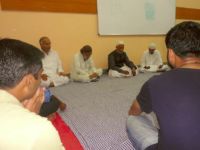Sometime ago I received a email message from a friend in which he noted that the Holy Father Francis is with many Christians, who get carried away by statements such as there is no scope in Islam for terrorism or tyranny, and believes that “Islam is a peaceful religion”. My friend qouted Apostolic Exhortation of Pope Francis entitled: “Evangelii Gaudium” chapter IV number 253 about Dialogue with Muslims. The English version of the sentence as published on the official webpage of the Vatican is: “….for authentic Islam and the proper reading of the Qur’an are opposed to every form of violence (emphasis mine).” He said that the Pope is generous but certainly reveals an inadequate understanding of Islam.
Certainly the problem is with the word ‘authentic’. Who decides what ‘authentic Islam’ is? It is true that many Muslims hold that authentic Islam is opposed to every form of religious violence. Some writers call them moderate Muslims. I do not qualify Muslims as moderate or otherwise. I do not judge them. I just refer to Muslims either as ‘many Muslims’ or as ‘some Muslims’. Many Catholic scholars on Islam note that it is true that the Qur’an does allow and even command violence in some verses, but many Muslims would claim that that violence may only be defensive.
The Qur’an speaks much about fighting (qital rather than jihad), but this is usually in a context of defending the community. Muslims would say that religious violence would be ruled out by the words ” lā ikrāha fi-l-dīn” (no compulsion in religion). However, we know that in Pakistan the blasphemy laws are misused. The monster ISIS is ravaging large areas of land in Syria and Iraq, where ancient Christian communities have lived in peace with Muslim neighbors for centuries. The punishment of death for apostasy from Islam is still maintained by many Muslims, but it is contested by others.
Let us consider the word ‘authentic”. For a Catholic Christian the authentic Islam is as described in Nostra Aetate: “The Church has also a high regard for the Muslims. They worship God, who is one, living and subsistent, merciful and almighty, the Creator of heaven and earth, who has also spoken to men. They strive to submit themselves without reserve to the bidden decrees of God, just as Abraham submitted himself to God’s plan, to whose faith Muslims eagerly link their own. Although not acknowledging him as God, they worship Jesus as a prophet, his virgin Mother they also honor, and even at times devoutly invoke. Further, they await the day of judgment and the reward of God following the resurrection of the dead. For this reason they highly esteem an upright life and worship God, especially by way of prayer, alms deeds and fasting.”
“This is the ‘Islam’ the Catholic Church knows and highly appreciates” writes Chris Hewer in an email communication to the present writer. He further stated that if one reads this part of Nostra Aetate thoroughly, “we note that there is no single hint of fundamentalism, extremism or any other kind of violence hailed or appreciated by the Catholic Church. In other words: The Catholic Church recognizes clearly and solely the spiritual dimension of Islam that pays attention at the same time, or even because of that, to the social needs, making efforts also for global unity, fraternity, friendship, justice, peace and harmony”.
Let us move now to “The proper reading of the Qur’an”. The Vatican sources say that Pope Francis wrote the Apostolic Exhortation “Evangelii Gaudium” in the Italian language, which was subsequently translated into various other languages. Here is the version in the original language as published on the official Vatican webpage: “…perché il vero Islam e un’adeguata interpretazione del Corano si oppongono ad ogni violenza.”.
Hewer noted that scholars who are fluent in both Italian and English say that the English version does not translate the sentence properly. “The original version uses the word “adeguata interpretazione” which means in English “adequate interpretation”. It appears to be that the Pope speaks about an adequate interpretation of the Qur’an and wished to be done so by the Muslims. The English version translated with “proper reading of the Qur’an”. Scholars find that this is too weak and cannot reflect that what Pope wanted to say. In fact, it deals here with “an adequate interpretation” of the Qur’an and not simply a proper reading. “Reading in English could be understood as a critical reading, but English language has also the word “Interpretation”. I don’t know why the translator used the word “reading” for “interpretation” comments Hewer.
We know that in the Qur’an there are many verses dealing with violence against Christians, Jews and infidels. The Pope is not asking Muslims to understand everything written in the Qur’an in a literal way but rather asking them to make “an adequate INTERPRETATION” which supports common values such as the dignity of human life, the well-being of the world, peace, harmony, justice and global fraternity as well as global friendship. In a nutshell: an adequate interpretation of the Qur’an is actually a human and contextual interpretation which is in accordance with the actual context of the world where human rights, human dignity and other common values as mentioned before will be underlined and promoted.
So, we need to read the texts carefully having the 15 centuries of history and historical and intellectual traditions of dialogue between followers of these two remarkable faiths when we make comments.
Let me conclude with the words of our Holy Father Pope Francis: “It is not possible to build bridges between people while forgetting God. But the converse is also true: it is not possible to establish true links with God while ignoring people. Hence it is important to intensify dialogue among the various religions, and I am thinking particularly of dialogue with Islam.”



Leave A Comment
You must be logged in to post a comment.